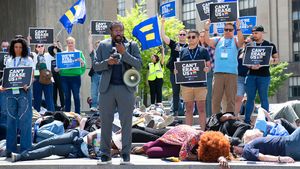President Donald Trump’s administration asked the U.S. Supreme Court on Thursday to reinstate his sweeping ban on transgender military service—just two days after Justice Department attorneys faced sharp skepticism from a federal appeals court panel in Washington, D.C.
Keep up with the latest in LGBTQ+ news and politics. Sign up for The Advocate's email newsletter.
In an emergency filing, the DOJ asked the court to lift a nationwide injunction issued by Washington state U.S. District Judge Benjamin Settle in Shilling v. United States. Settleblocked the enforcement of Trump’s January executive order banning transgender people’s service. He ruled that the policy likely violates the Fifth Amendment’s equal protection guarantee and called it “dramatic and facially unfair,” citing a lack of evidence that transgender troops harm military readiness.
The filing argues the policy is legally indistinguishable from a 2018 “Mattis policy,” which the high court previously allowed to take effect.
Related: DOJ appeals block on Pentagon’s transgender military ban
The DOJ says courts should give broad leeway to military decisions and claims the policy only needs to be “rational”—meaning it just has to make some sense, even if it’s flawed or controversial. That legal test, rational-basis review, is the most forgiving standard in constitutional law.
The government claims that allowing transgender people with gender dysphoria to serve would impact military effectiveness and increase health care costs.
“The Department has found the current policy to be inconsistent with the high mental and physical standards necessary for military service,” the DOJ wrote, warning the injunction could undermine national security.
Related: Trump's DOJ struggles defending trans military ban during D.C. appeals court hearing
Lower court judges have said that the government is misinterpreting its reports and that the government spends far more on erectile dysfunction medications annually than it has for gender-affirming care in ten years.
Lambda Legal CEO Kevin Jennings told The Advocate that the organization will challenge the DOJ’s Supreme Court claim.
“Lambda Legal will shortly file a response asking the Supreme Court to uphold our victory and allow patriotic trans Americans to continue to serve our country,” Jennings said.
The named lead plaintiff in the case now before the high court is Commander Emily Shilling, a transgender woman and decorated Navy officer who has served more than two decades, including 60 combat missions. Her case represents a group of active-duty transgender service members and a transgender man seeking to enlist, all of whom face discharge or denial of service under Trump’s order.
“This is just pure bigotry. Plain and simple," Jennings said. "Bigotry is not rational. It’s irrational, and what the Trump administration is doing is irrational because trans service members like Commander Shilling, who we’re representing, who has flown over 60 combat missions for this country, serve with distinction and honor. There’s no reason for this ban beyond bigotry.”
Jennings noted that Lambda Legal is committed to the long haul. “We don’t file a case unless we plan to stick with it to the end,” he said. “We will stay with the suit for a decade if we have to. We’ve done that before.”
He added that the plaintiffs are ordinary Americans who stepped up because of injustice. “They’re not trying to be heroes. They’re just trying to live their lives—and serve their country,” he said. “They often get enormous hate mail and harassment, but they do it not just for themselves but for the whole community.”
And in a final note, Jennings pointed to the irony of Trump—who dodged the draft—trying to purge volunteers from the armed forces. “We don’t have a draft anymore. Everybody in our military volunteered,” Jennings said. “Who’s the real patriot here? The man who dodged the draft, or the trans woman who flew over 60 combat missions?”The filing follows a rough showing for the government in Talbott v. United States on Tuesday, a parallel case in which a D.C. Circuit panel questioned the administration’s legal rationale. DOJ attorney Jason Manion admitted under oath that he could not answer how the policy would be implemented or enforced or whether similar automatic discharges existed for any other condition.
“You can serve as a transgender person as long as you don’t serve as a transgender person?” Judge Cornelia Pillard asked, summarizing the policy’s contradictions.
Related: Appeals court denies Trump DOJ’s request to halt injunction on trans military ban — for now
Shannon Minter, legal director at the National Center for Lesbian Rights, which, along with GLAD Law, is representing the Talbott plaintiffs, told The Advocate that he wasn’t surprised by the government’s move.
"We expected the government would ask the Supreme Court for an emergency stay as the administration has been doing that routinely, in the hope that the Supreme Court will override lower court decisions enjoining blatantly unconstitutional actions," Minter said. "The Talbott service members will urge the court to reject this request. There is no basis for a stay, so we are hopeful the court will deny it and allow the normal judicial process to continue."
On Thursday afternoon, Iraq and Afghanistan Veterans of America founder and executive director Paul Rieckhoff appeared on MSNBC to denounce Defense Secretary Pete Hegseth’s role in advancing the ban.
“This is what happens when you have an overtly extreme political culture warrior as your Secretary of Defense,” Rieckhoff said. “He says that DEI is the enemy instead of Russia. That’s the problem here. The reality is that transgender people should be able to openly serve just like everyone else. [The ban is] bad politics, it’s bad morality—and it’s very bad for our national defense.”
Rieckhoff called the policy disruptive not just for those being targeted, but for their entire units: “You have to actually rip transgender service members out of their unit and impact the people around them. It’s another distraction from bigger issues.”
The government’s Supreme Court request follows the Ninth Circuit’s upholding a similar injunction in Shilling. Both cases challenge Executive Order 14183, which claims that transgender identity is incompatible with military service.
D.C. District Judge Ana Reyes, who issued the Talbott injunction, described the ban as “soaked in animus and dripping with pretext.”
Editor's note: This story has been updated with additional reporting.














































































